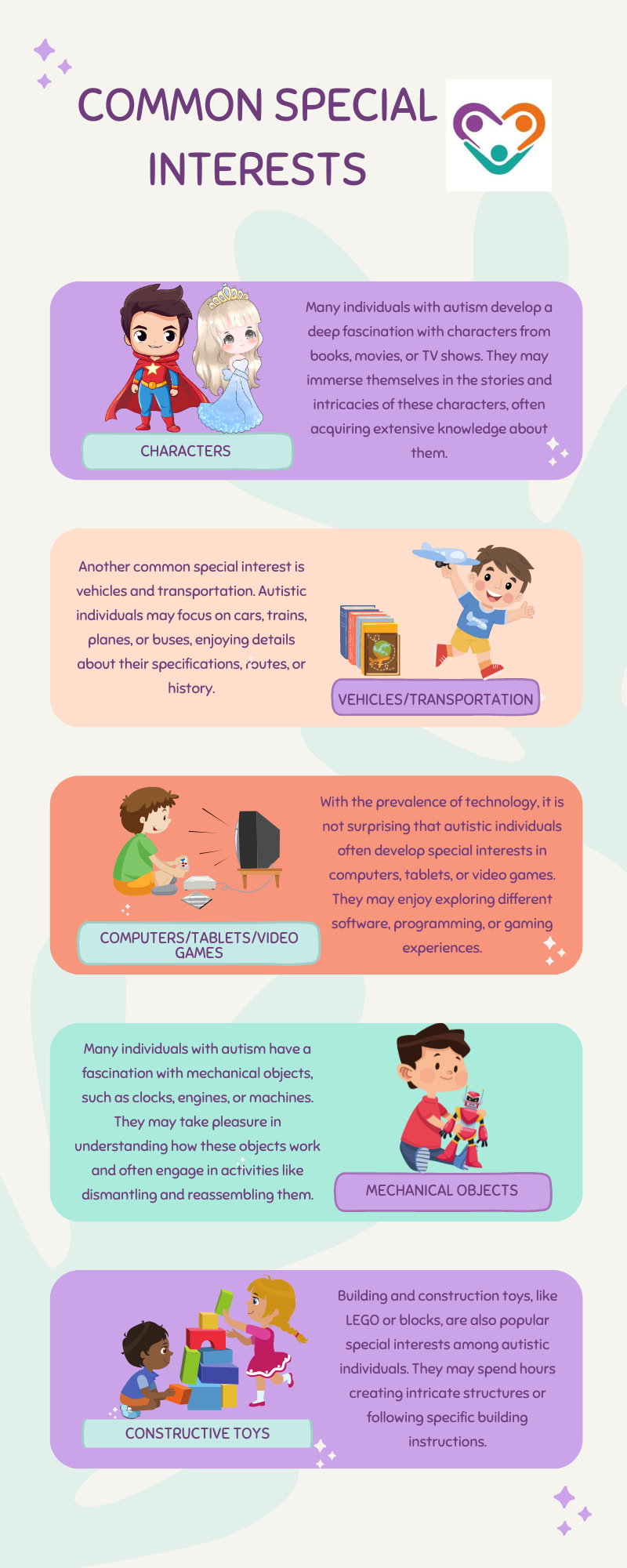Special interests play a significant role in the lives of individuals with autism. These interests are characterized by an intense focus on a specific topic or activitythat goes beyond what is considered typical or functionally useful.
Understanding the definition and characteristics of special interests is crucial in recognizing their importance in the lives of individuals with autism.
Here, we’ll have a look at what special interests are in the context of autism.
What are Special Interests?
Autistic special interests are usually less socially oriented and more circumscribed compared to typical interests. They often involve a deep and passionate fascination with a particular subject or activity.
These interests can range from collecting items and listening to music repetitively, to focusing intensely on narrow topics like insects fighting. Some interests may be commonplace such as trains or animals, while others may be more quirky like toilet brushes, tsunamis, or office supplies.
What sets special interestsapart is the level of intensity and the extent to which individuals on the autism spectrum engage with them. Autistic individuals may spend a significant amount of time learning, discussing, or participating in activities related to their special interests.
These interests can provide a sense of purpose and fulfillment, serving as a source of joy and motivation.

Importance of Special Interests
Special interests have a profound impact on the lives of individuals with autism. They can provide several valuable benefits and play a crucial role in their well-being.
Researchhas shown that special interests contribute to higher subjective well-being and satisfaction across specific life domains, including social contact and leisure, for autistic individuals.
One of the key benefits of special interests is their ability to support emotional regulation. Engaging in a special interest can provide a sense of comfort and familiarity, helping individuals reduce anxiety and stress. Pursuing an interest allows individuals to immerse themselves in something they find enjoyable and meaningful.
Moreover, special interests have been found to assist in the development of social skills. By sharing their interests with others who have similar passions, individuals with autism can form connections, build relationships, and enhance their social interaction abilities.
Needless to say, special interests can provide common ground for communication and facilitate social engagement.
Special interests in autism can have a profound positive impact on individuals, particularly in terms of emotional regulationand social skills development.
Pursuing a special interest can be a powerful tool for emotional regulation in individuals with autism. Engaging in something familiar and loved can have a calming effect, reducing anxiety and stress.
Researchconducted over the past few years has shown that special interests are valuable to people on the spectrum, contrary to the previous belief that they distract from schoolwork and social interactions.
Special interests have been found to build self-confidence and help individuals cope with their emotions. Autistic individuals often feel enriched by their special interests, as they provide a sense of comfort and familiarity. This can be especially helpful during times of heightened emotions or sensory overload, providing a soothing and grounding experience.
Special interests also play a crucial role in the development of social skills for individuals with autism. Contrary to the belief that special interests hinder social interactions, studieshave shown that they actually contribute to social growth and learning.
Autistic individuals who engage in their special interests often find common ground and shared experiences with others who have similar interests, fostering social connections and friendships.
In addition to emotional regulation and social skills development, special interests have been described as a lifeline for individuals with autism. Preliminary researchsuggests that the brain’s reward system in people with autism may respond more to special interests than to social rewards.
Autistic individuals may have heightened responses to their own interests in brain regions governing emotion, which could explain the rewarding qualities of these interests and why they can be so all-consuming.
Overall, special interests have a significant positive impact on individuals with autism, contributing to emotional well-being, social skills development, and overall satisfaction with life.
Types of Special Interests
Special interests are a significant aspect of autism. These interests vary among autistic individuals, with some common themes and certain differences based on gender.
Common Special Interests
Autistic individuals often develop special interests that capture their attention and enthusiasm. Some common special interests observed in autistic individuals include:

Gender Differences in Special Interests
While there is a considerable overlap in special interests between genders, some differences have been observed. Females with autism are more likely to have special interests in creative activities like drawing, painting, or acting.
These interests provide an outlet for their artistic expression and allow them to explore their imagination.
On the other hand, males with autism tend to exhibit special interests in characters, vehicles/transportation, computers/video games, mechanical objects, and constructive toys. These interests often involve a focus on collecting information, technical details, or mastering specific skills.
Understanding these gender differences can help parents, caregivers, and educators support individuals with autism in exploring and nurturing their special interests.

All-Consuming Nature of Special Interests
Special interests in autism are often described as all-consuming, capturing the individual’s attention and focus to a significant degree. These interests can become the primary focus of the individual’s thoughts, conversations, and activities. This all-consuming nature is a unique characteristic of special interests in autism.
The intensity of focus on special interests can vary among individuals with autism. Some individuals may have a narrow and highly specific interest, while others may have a broader range of related interests.
The depth of knowledge and engagement in the special interest can be remarkable, with individuals displaying exceptional expertise and recall of informationrelated to their specific area of interest.
While the all-consuming nature of special interests can sometimes present challenges in other areas of life, such as social interactions or daily responsibilities, it is important to recognize the positive aspects of these interests. Special interests often provide a sense of purpose, enjoyment, and fulfillment for individuals with autism.
They can serve as a source of motivation, self-expression, and identity, contributing positively to their overall well-being. For specialized support, Golden Care Therapy offers services at ABA centers in New York, New Jersey, Georgia, and Indiana. Contact usor book a session to learn more.



